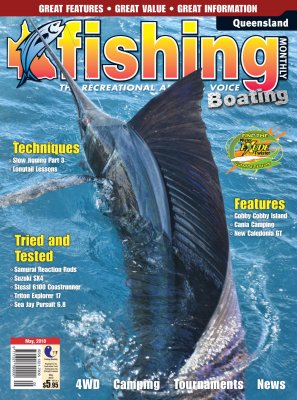Slow Jigging: The Outfits by Grant Dixon
 While the jury seems to be out as to the most suitable rod to use for slow jig fishing, especially with regard to length, most anglers fishing this style do agree on the type of reel.
While the jury seems to be out as to the most suitable rod to use for slow jig fishing, especially with regard to length, most anglers fishing this style do agree on the type of reel.
Many of the rod manufacturers have produced 'specialist' slow jig product that varies from around 1.75m (6'6") to 2.4m (8'). And the one thing they all have in common is the action.
Generally, the slow jig rods are strong through the butt/bottom section with a fast action tip. The blank actions all tend to be more 'fold away' or fast tapered rather than parabolic. The length of the fore grip should be long enough to enable the angler to get a good purchase on the rod, should they hopefully become engaged in a drawn out battle with a good fish. Guides need to be hardened or designed specifically to handle the rigors of braid line. Braided line fights well above its nominated weight, and is loaded onto reels that have XOS drags, so the reel seats need to be well made with the reel foot hoods beefed up.
The reels too are a bit of a mixed bag with overhead multiplying reels more prevalent than fixed spook spin reels; the latter tending to be more of an adaptation from soft-bait techniques.
Talking with anglers who have taken slow jig fishing to heart, the smart money seems to be on good quality, compact overhead reels. Generally these are loaded with braid in the 4-10kg range. The preference is for non-level wind reels with reputable drag systems. Braid, with its almost zero-stretch qualities, is hard on gear so the best components in both the rod and reel is imperative.
Overhead reels are preferred because of the better control anglers have over their lures, especially on the drop when the fish quite often attack.
While still in its infancy, slow jig techniques are being used to target snapper in the main, along with kingfish but they work well on a number of species. John dory in particular are suckers for these live-bait imitations.
But if you don't want to go to the trouble or expense of purchasing another outfit specifically to slow jig, don't despair. Your current soft-baiting gear will suffice. The more specialised your approach, the more it is going to cost but having said that, no one ever regretted buying quality when it comes to fishing tackle.
The following is the gear our major tackle distributors have recommended as being suitable for fishing slow jigs. In the main they are combos with one or two specialist rod manufacturer's product added to the mix. Where information was asked for but not supplied, it is marked N/S.